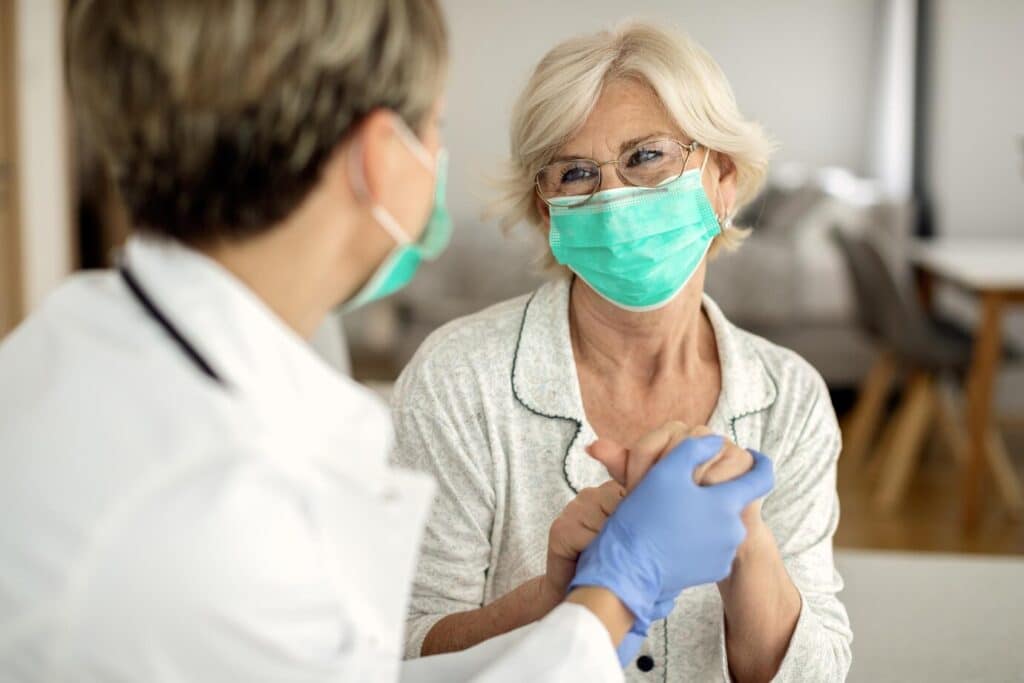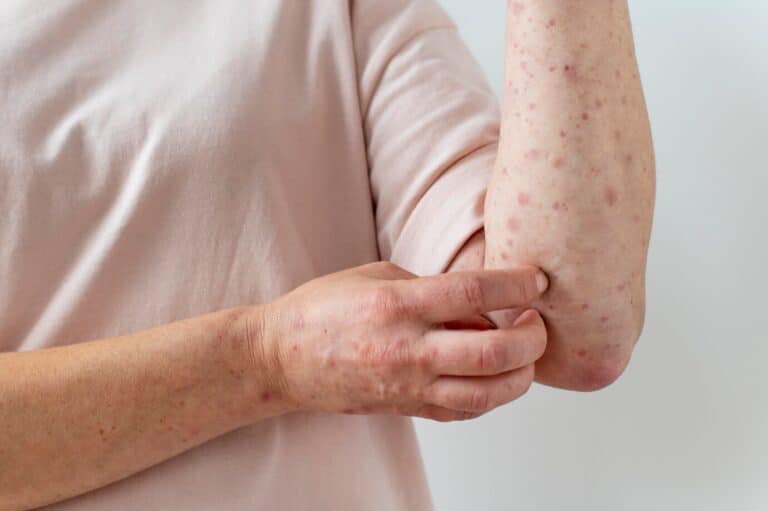Our skin requires more attention and care to maintain health and vitality as we age. Seniors, in particular, may be more susceptible to various skin diseases and conditions due to weakened immune systems and prolonged exposure to environmental elements. In this blog post, we’ll explore the importance of early detection in senior skin health and provide valuable insights into recognizing and addressing common skin diseases. At The Oaks at Paso Robles, we understand the significance of proactive skincare for our senior residents, and we’re committed to sharing essential information to help safeguard their well-being.
Recognizing Common Skin Diseases:
Understanding the Signs and Symptoms
Skin diseases can manifest in various ways, from rashes and lesions to discoloration and itching. Understanding the signs and symptoms is crucial for early detection. For example, conditions like eczema often present with red, inflamed patches accompanied by intense itching. On the other hand, psoriasis may appear as thick, silvery scales on the skin’s surface. By recognizing these symptoms, seniors can seek prompt medical attention and intervention.
Exploring the Impact of Aging
Aging itself can exacerbate certain skin conditions and predispose seniors to others. The natural decline in skin elasticity and moisture retention can lead to dryness and increased susceptibility to irritation. Additionally, reduced circulation may impede the skin’s healing ability, making seniors more susceptible to infections and slower wound recovery. Understanding these age-related changes is essential for tailoring skincare routines and preventive measures.
Importance of Regular Skin Checks
Regular skin checks are vital for identifying any changes or abnormalities early on. Seniors should conduct self-examinations or seek assistance from caregivers or healthcare professionals. Encourage seniors to pay attention to new moles, growths, or changes in existing skin lesions. Early detection through regular monitoring can significantly improve outcomes and facilitate timely intervention when necessary.

Regular Skin Checks
Preventive Measures and Care Tips:
Prioritizing Sun Protection
Excessive sun exposure is a leading cause of skin damage. It contributes to the development of various skin cancers, including melanoma. Seniors should prioritize sun protection by wearing sunscreen with a high SPF, seeking shade during peak hours, and wearing protective clothing and accessories like hats and sunglasses. Incorporating these habits into daily routines can help minimize sun-related skin damage.
Maintaining Proper Hydration
Proper hydration is essential for maintaining healthy skin, especially for seniors. Dehydration can exacerbate skin dryness and impair the skin’s barrier function, making it more susceptible to damage and infection. Encourage seniors to drink adequate water daily and use moisturizers to replenish lost moisture. Humidifiers can also be beneficial, particularly in dry climates or indoor environments.
Adopting a Gentle Skincare Routine
Seniors should adopt a gentle skincare routine catering to their needs and concerns. Harsh cleansers and abrasive exfoliants can strip the skin of natural oils and exacerbate dryness and irritation. Opt for mild, fragrance-free products formulated for sensitive skin and avoid excessive scrubbing or rubbing. Moisturize regularly to maintain skin hydration and protect the skin barrier from external aggressors.
Common Skin Conditions in Seniors:
Addressing Dermatitis and Eczema
Dermatitis and eczema are common skin conditions characterized by inflammation and irritation. Seniors may experience flare-ups due to various triggers, including allergens, stress, and environmental factors. Itching and redness are typical symptoms, often accompanied by dry, scaly patches. Managing these conditions involves identifying triggers, moisturizing regularly, and using prescribed medications such as corticosteroids or antihistamines to alleviate symptoms.
Managing Fungal Infections
Fungal infections such as athlete’s foot and ringworm can affect seniors, particularly those with weakened immune systems or compromised circulation. These infections thrive in warm, moist environments, making the feet, groin, and skin folds common targets. To treat and prevent fungal infections, seniors should practice good hygiene, keep affected areas clean and dry, and use antifungal medications as directed by a healthcare professional.
Understanding Skin Cancer Risks
Skin cancer, including basal cell carcinoma, squamous cell carcinoma, and melanoma, becomes more prevalent with age, especially in seniors with a history of sun exposure or a weakened immune system. Regular skin checks and prompt evaluation of suspicious lesions are critical for early detection and treatment. Encourage seniors to schedule annual skin exams with a dermatologist and promptly report any changes or abnormalities.
Nutrition and Lifestyle Factors:
Importance of Nutrient-rich Diet
A balanced diet rich in vitamins, minerals, and antioxidants is vital in maintaining skin health and resilience. Seniors should prioritize foods high in essential nutrients, such as fruits, vegetables, whole grains, lean proteins, and healthy fats. Nutrients like vitamins C, E, and zinc support collagen production, protect against oxidative stress and promote skin repair and regeneration.
Managing Stress and Mental Well-being
Chronic stress can exacerbate skin conditions and compromise the immune system, increasing susceptibility to infections and inflammation. Encourage seniors to engage in stress-reducing activities such as meditation, yoga, or hobbies they enjoy. Prioritizing mental well-being can positively impact overall health and skin quality.
Staying Active and Maintaining Mobility
Regular physical activity promotes circulation, enhances immune function, and supports overall well-being, including skin health. Seniors should aim for aerobic exercise, strength training, and flexibility exercises tailored to their abilities and preferences. Staying active benefits skin health and improves mood, energy levels, and quality of life.
Maintaining Senior Skin Health
In conclusion, maintaining senior skin health requires a holistic approach that addresses common skin conditions, nutrition, lifestyle factors, and preventive measures. By staying vigilant, adopting healthy habits, and seeking timely medical attention, seniors can protect their skin and enjoy a better quality of life. At The Oaks at Paso Robles, we’re dedicated to supporting our senior residents in their skincare journey and empowering them to live life to the fullest. Remember, your skin deserves the best care. Take proactive steps today for healthier, happier skin tomorrow.
We are here to help.
For personalized assistance and guidance on senior skin health, contact The Oaks at Paso Robles at 805-835-4251. Our team of experts is here to provide you with the resources, support, and care you need to maintain optimal skin health and well-being. Don’t hesitate to reach out—we’re here to help you thrive.




